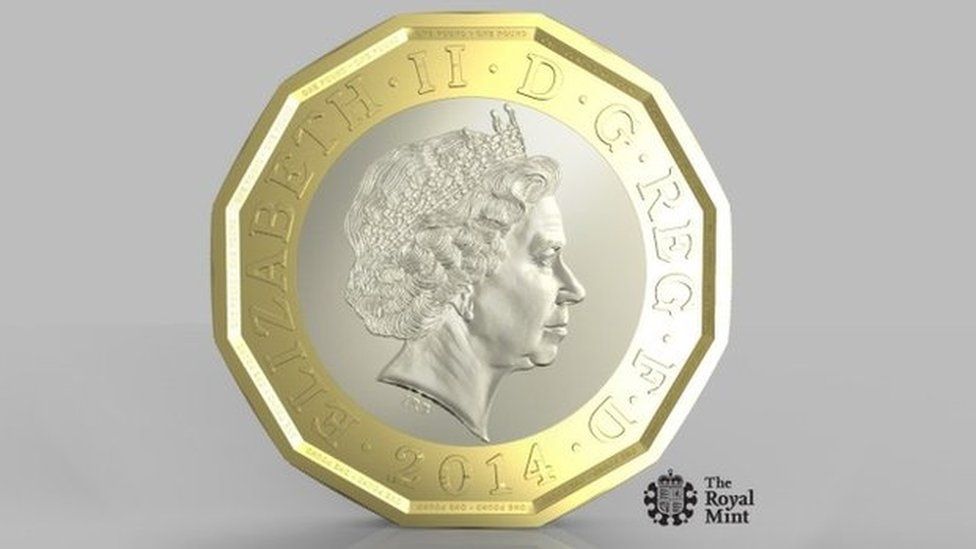The pound’s fall and why it matters
- Published
- comments

Have you seen the new pound coin? It's a 50p piece.
Admittedly, currency jokes aren't quite up there with Phoebe Waller-Bridge in Fleabag ("People make mistakes. That's why they put rubbers on the end of pencils"), but the point is well made.
Harold Wilson might have claimed that a devaluation of sterling doesn't affect the pound in your pocket, but it certainly affects the way the economy operates and therefore all of us.
There are three broad reasons for the sickly state of the pound, which fell again this morning by a precipitate 0.9%.
'Flash crash'
First, and fundamentally, it is a market judgement on the future growth potential of the UK economy relative to the future growth potential of competitor economies, and their currencies.
If it is judged that the value of UK assets will grow less quickly in the future - and most economists have downgraded growth next year following the Brexit vote - then investors will discount those assets, sell sterling and buy more favourable currencies such as the dollar.
Second, this downward trajectory is then emphasised by near-term market makers who "short" the currency, making a profit margin on the pound's decline.
Mix that with millions of electronic trading programmes which automatically follow sell or buy trades and toxic and destabilising events such as the "flash crash" of last Friday are the result.
Everyone becomes a little more nervous and the market for sterling becomes a little more sickly.
Particularly as the government prepares for a "hard" Brexit - where the UK leaves the European Union single market - which many investors believe will be a poor outcome for the economy.
Third, differential interest rate expectations drive currency moves.
In Britain, the Bank of England has made it clear it expects to engage in more monetary loosening before the end of the year.
That could mean an interest rate cut to 0.1% next month, although the positive economic data since the Bank signalled its intentions in August could mean that move is delayed or abandoned.
At the same time, the Federal Reserve, America's central bank, is signalling a rate rise.
Interest rate rises usually strengthen currencies - so the dollar becomes a better buy than sterling.
Debt issue?
As well as the volatile currency market, what about government borrowing?
Yields on 10-year government debt are up to 1% from 0.52% in August, though they fell a little today.
Does that mean investors are becoming wary of lending to a country with a weakening currency and a government which has signalled a possible fiscal loosening driven by more borrowing?
Not yet, is the answer to that question.
As Jonathan Loynes, chief European economist at Capital Economics, told me: "Gilt yields are still well below their start of year and pre-referendum levels, as well as the assumption by the Office for Budget Responsibility [the independent economic watchdog] for this fiscal year on average - so the Chancellor will still save money on interest payments versus the expectations in the Budget."
At the moment, investors are very willing to extend rock-bottom borrowing facilities to the government as the fundamentals of the economy are strong.
Rupert Harrison, the chief macro-strategist at Blackrock and George Osborne's former chief of staff, says that, as yet, the rise in yields does not appear to be suggesting an increase in the UK's "risk premium" - an extra charge investors levy because of a country's economic performance or perceived lack of government discipline on issue such as debt.
Political issue
Why does the fall of the pound matter? On the upside, it matters for exporters which are boosted as their goods are far cheaper on foreign markets.
It matters for multinational companies like pharmaceutical firms which earn much of their income in dollars.
It matters for the tourism industry in the UK, as foreign visitors flock here for bargains and good value holidays.
On the downside, it matters for tourists travelling abroad who will find everything they buy much more expensive.
It matters for the food and fuel this country imports as it becomes more expensive.
It matters for inflation, as the rise in import costs feeds through to businesses and the High Street.
And remember, it does not need much of a rise in inflation to wipe out real income growth which at present is running at around 2%.
And if real incomes start falling, that is when the fall in sterling becomes a truly political issue.
Because the pound in your pocket will actually be worth less.
- Published7 October 2016
- Published24 April 2016
- Published29 August 2016
- Published23 January 2017